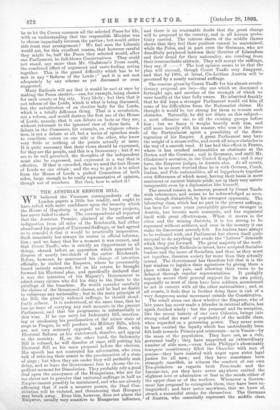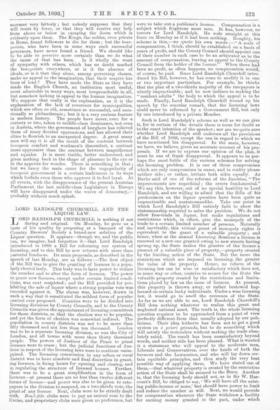THE AUSTRIAN REFORM BILL.
WE believed the Viennese correspondents of the London papers a little too readily, and ought to have relied with more confidence upon the tenacity which the House of Hapsburg, in regard to its larger projects, has never failed to show. The correspondents all reported that the Austrian Premier, alarmed at the outburst of indignation from all sides of the Reichsrath, had either abandoned his project of Universal Suffrage, or had agreed so to remodel it that it would be practically inoperative. Such unanimity has always its source in official informa- tion; and we fancy that for a moment it was correct, and that Count Taaffe, who is strictly an Opportunist in all things, shrank before an opposition which appeared to dispose of nearly two-thirds of the entire Reichsrath. Before, however, he announced his change of intention officially, he visited the Emperor, whom he presumably found entirely unmoved, for on his return he brought forward his Electoral plan, and specifically declared that it was the intention of his Majesty's Government to admit every citizen who did his duty to the State to the privilege of the franchise. He would consider carefully the claims of the threatened classes, and he had no desire to submerge any nationality ; but t,o the main principle of the Bill, the greatly widened suffrage, he should stead- fastly adhere. It is understood, at the same time, that he has no hope of carrying any such measure in the present Parliament, and that his programme is substantially in this wise. If he can carry his Indemnity Bill, sanction- ing or condoning his proclamation of the minor state of siege in Prague, he will produce his Military Bills, which are not very seriously opposed, and will then, with Electoral Reform as his watchword, dissolve, and appeal to the country. If, on the other hand, the Indemnity Bill is refused, he will dissolve at once, still putting his Electoral Bill as his main proposal before the electors. His speech has not contented his adversaries, who even talk of refusing their assent to the proclamation of a state of siege ; but when they are cooler they will probably seek delay, and so leave the Government free to choose the ex- pedient moment for Dissolution. They probably rely a good deal upon the annoyance of the Hungarians, who fire far too clever not to perceive that universal suffrage in half an Empire cannot possibly be maintained, and who are already affirming that if such a measure passes, the Dual Con- stitution will be violated, and threatening that Hungary may break away. Even this, however, does not alarm the Emperor, usually very sensitive to Hungarian influence, and there is no reasonable doubt that the great change will be proposed to the country, and in all human probe- bitity carried. The intense alarm of the middle classes shows that they feel their position cannot be maintained, while the Poles, and in part even the Germans, who are dreadfully perplexed between their theories of Liberalism and their dread for their nationality, are receding from their irreconcilable attitude. They will accept the suffrage, they say, if — ? The best opinion seems to be that the plan will succeed, though Count Taaffe may disappear, and that by 1895, at latest, Cis-Leithan Austria will be governed by a nearly universal suffrage.
The reasons given by Count Taaffe for his almost revolu- tionary proposal are two—the one which we discussed a fortnight ago, and another of the strength of which we were hardly at the time fully aware. He admitted frankly that he did hope a stronger Parliament would rid him of some of his difficulties from the Nationalist claims. He thought it would be ,too strong for them to remain such obstacles. Naturally, he did not dilate on this subject— a most offensive one to all the existing groups before him ; but we fancy it weighs heavily with him, and still more heavily with his master, who sees in the force of the Particularist. spirit a possibility of the disin- tegration of his Empire. A great Parliament may have the weight of a steam-roller, and crush all minor obstacles in the way of a smooth road. It has had this effect in France, where it has crushed nationalities as obstinate as the Breton and the Corsican; and in Germany, and until Mr. Gladstone's secession, in the United Kingdom ; and it may have, the Emperor judges, in Austria also. At all events, he can be no more worried than he is with German, Czech, Italian, and Pole nationalities, all at loggerheads together over differences of which many, having their basis in mere sentiment or ancient historic pride, are in their very nature insuperable even by a diplomatist like himself.
The second reason is, however, pressed by Count Taaffe with vehemence, and seems to be acknowledged as accu- rate, though distasteful, by his strongest opponents. The labouring class, which has no part in the present suffrage, has been for some years perceptibly growing stronger in Austria, has become more conscious, and has organised itself with great effectiveness. When it moves in the cities and the mining districts, it is too strong to be repressed without soldiers, and even in the country it can make its discontent severely felt. Its leaders have always to be reckoned with, and Parliament has shown itself quite unequal to do anything but evade the "Labour" demands which they put forward. The great majority of the work- men, though only Radicals in intent, have accepted Socialist leaders and the name of Socialists, and thus, as they must act together, threaten society far more than they actually intend. The Government has therefore felt that it is the best wisdom to legalise their agitations by giving them a place within the pale, and allowing their views to be debated through regular representatives. It probably hopes to secure their general support for its own policy, especially as most of them have been soldiers, accustomed to act in concert with all the other nationalities ; and, at all events, it feels that in further delay there is risk of a very dangerous social movement outside the Constitution.
The result alone can show whether the Emperor, who of late years has never made a blunder in internal affairs, has again decided wisely ; but the proposal and its reception, like the recent history of our own Colonies, brings into strong relief the want of popularity of the middle class, when regarded as a governing power. They never seem to have excited the loyalty which has undoubtedly been felt both towards Princes and aristocrats—as in Venice—by the mass of the population. They have not, as a rule, governed badly ; they have supported an extraordinary number of able men,—even Louis Philippe's abominably bourgeois constituency filled the Chamber with men of genius—they have insisted with anger upon strict legal justice for all men ; and they have sometimes been strangely unselfish, as witness the conduct of our own Ten-pounders as regards both Free-trade and the Income-tax, yet they have never any where excited the slightest .love or admiration or fear in the minds either of the upper class or of the workers. Whenever a Govern- ment has proposed to extinguish them, they have been ex- tinguished ; and have never anywhere, that t we know of, struck a successful stroke for themselves. The Germans of Austria, who essentially represent the middle class, murmur very bitterly ; but nobody supposes that they will resist by force, or that they will receive any help from above or below in escaping the doom which is evidently upon them. The Kings, the nobles, even priests in Rome, found followers to die for them ; but the boar- who have been in some ways such successful governors, have never found a friend. We should like to be able to perceive more certainly than we do what the cause of that has been. Is it wholly the want of sympathy with others, which has no doubt marked the bourgeoisie everywhere, or is it the absence of ideals, or is it that they alone, among governing classes, make no appeal to the imagination, that their sceptre has been of lead ? They have made the State as they have made the English Church, an institution most useful, most admirable in many ways, most irreproachable in all, but somehow lacking in appeal to the human imagination. We suppose that really is the explanation, as it is the explanation of the lack of reverence for municipalities, which are often so old, sometimes so successful, and occa- sionally so philanthropic ; but it is a very curious feature in modern history. The people have never, even for a century or two, taken to middle-class dominance, not even in Austria, where the government of burghers has relieved them of many decided oppressions, and has allowed their cities to flourish to an unexpected degree. A great many men will say it is all the result of the contrast between bourgeois comfort and workmen's discomfort, a contrast more oppressive than the contrast between magnificence and squalor. It is more visible, better understood, and gives nothing back in the shape of pleasure to the eye or to the appetite for wonder. There is something in that ; but we fancy the main cause for the unpopularity of bourgeois government is a certain leadenness in its ways which forbids even those who approve it to feel loyal. At all events, with the disappearance of the present Austrian Parliament the last middle-class Legislature in Europe will have disappeared under the waves of democracy,— probably without much splash.







































 Previous page
Previous page